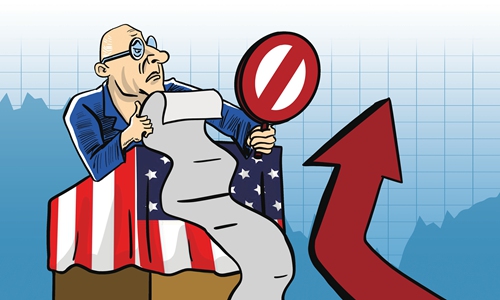Impeding Chinese firms will hit US as global financial center
By Xu Weihong Source:Global Times Published: 2020/5/24 21:04:22

Illustration: Luo Xuan/GT
Some US politicians and media have raised their voices to undermine Chinese firms listing in American capital markets, aiming to promote "decoupling" of China-US financial sectors, but forcing Chinese firms out of the market will be a loss-loss move as it will hinder the US' role of being the global financial center.Recently the US senate passed a Holding Foreign Companies Accountable Act, noting that if the Public Company Accounting Oversight Board is unable to inspect a security issuer's public accounting firm for three consecutive years, the issuer's securities will be banned from trade.
Given that the US has been trying to blame everything on China to cover its failure in pandemic prevention, concerns are raised that if the newly passed bill will extend the China-US trade war into the financial sector, and will Chinese securities massively withdraw from the US capital market?
China has been the fastest growing giant economy for the past three decades. Companies that developed comprehensively in China always bring in promising appreciation potential, which global investors couldn't resist. It was the American capital market's advantage of adopting flexible financial regulations and regulatory principles to attract these companies' IPOs.
The diversity of institutional investors, risk appetites and financial background in the US capital market have attracted IPO financing from all over the world, especially from China, which promotes the development of China's economy and the progress of globalization as well.
In the meantime, the gradually formation of considerable size of the "Chinese securities" sector in the US capital market also enhanced the leading role of New York in the world's financial area, leaving Europe, Japan and Singapore lagging far behind.
In fact, China and the US have derived a series of agreements with regard to the highly focused issue of accounting standards and the information disclosure.
For the recently alleged Luckin Coffee's fraud, the China Securities Regulatory Commission noted that it has always taken a positive attitude toward cross-border regulatory cooperation and supports overseas securities regulators in investigating financial fraud of listed companies within its jurisdiction. However, there is obvious political intention behind the US suddenly breaking the previous agreements and trying to come up with new bargaining chips.
In a bid to win the re-election this year, the Trump administration is bound to keep banging the drum of the "America First" slogan and may even try to retain its populist followers through words that challenge the interests of Wall Street. However, forcing out the Chinese stocks is a loss-loss strategy that will hinder the US' role of being the global financial center, and the listing of Chinese firms in the American capital market is actually in line with the US' interests.
Chinese enterprises have been welcomed by global capital markets due to their large size and large incremental potential for their IPOs.
It is now the right path for China and the US to deepen cooperation in capital markets, and steadily and rationally promote the joint supervision. Some Chinese firms go public in the US through the flexible arrangement of the financial system and the legal regulation system is in line with both sides' interest, which does not equal to fraud. Companies like Luckin are typical examples for China and the US to crack down by joint efforts.
In a sense, both the new regulatory measures issued by Nasdaq or the bill are actually for all foreign public companies listing in the US. Certain politicians' ill-intended agitation of referring to it as restrictions specifically for Chinese firms is trying to promote "decoupling" of China-US financial sectors. Chinese firms don't need to play along with this hype, but should get prepared beforehand and keep enhancing their reliability in capital markets.
The author is chief economist of the Zhongzheng Jiaotong Fund, and an academic committee member of the Pangoal Institution.
Posted in: EXPERT ASSESSMENT